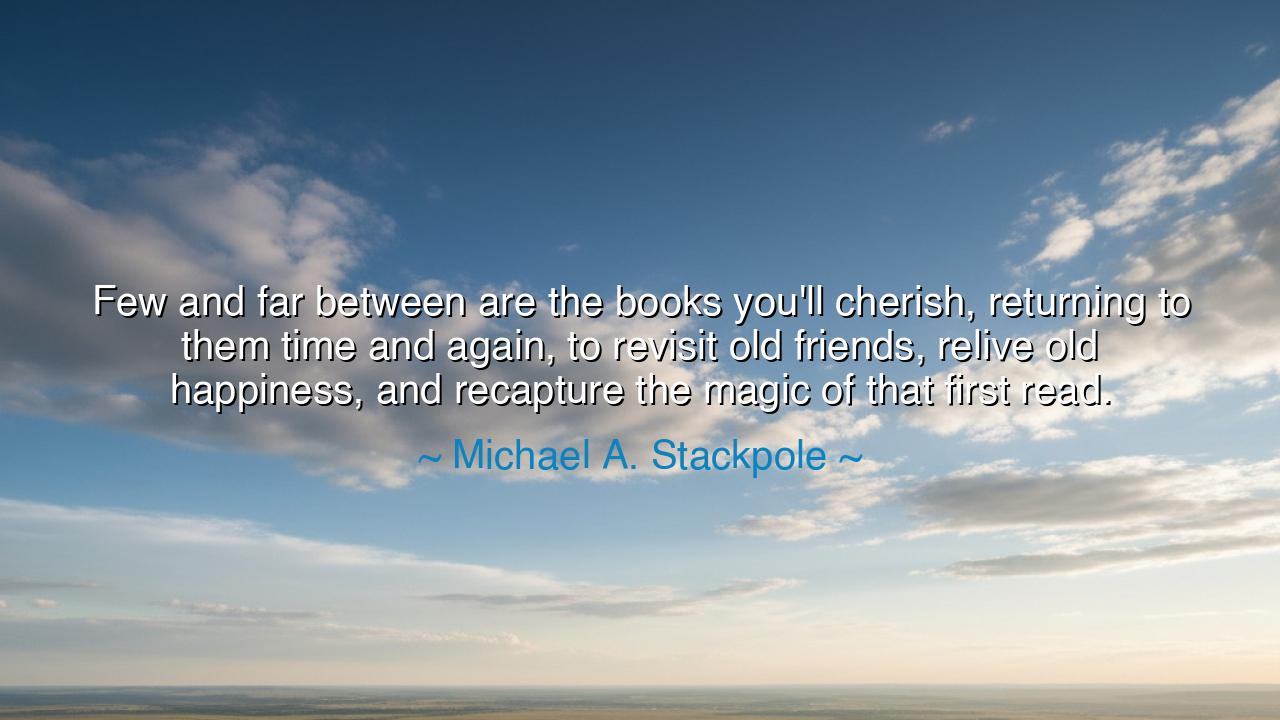
Few and far between are the books you'll cherish, returning to
Few and far between are the books you'll cherish, returning to them time and again, to revisit old friends, relive old happiness, and recapture the magic of that first read.






When Michael A. Stackpole wrote, “Few and far between are the books you’ll cherish, returning to them time and again, to revisit old friends, relive old happiness, and recapture the magic of that first read,” he was not simply speaking as a writer, but as a keeper of the ancient bond between the written word and the human soul. His words carry the fragrance of reverence — a recognition that books, in their highest form, are more than ink upon paper. They are living companions, repositories of wisdom, mirrors of the heart, and bridges between what we are and what we long to be. Through them, time dissolves, and the reader communes not only with the author but with every emotion, dream, and revelation ever kindled by that story’s light.
Stackpole’s insight is born from the age-old relationship between humanity and its stories. From the campfires of the ancients to the glowing screens of our age, man has always sought meaning through the telling and retelling of tales. Yet among the countless words written, only a sacred few take root in the heart. These are the books that, when closed, still whisper; the ones that grow with us as we age, revealing new truths upon each encounter. To cherish a book is to experience what the philosophers once called anamnesis — a remembering of something eternal, a stirring of the spirit that feels older than one’s years. Such books are rare because they do not merely entertain; they awaken.
Think of “The Little Prince” by Antoine de Saint-Exupéry — a book read by children but understood fully only by adults who have forgotten how to see with their hearts. Each reading transforms the reader anew. The child delights in the stars and the fox; the adult grieves with the aviator; the elder finds peace in the prince’s departure. That is the kind of magic Stackpole speaks of — the “magic of that first read” that lingers like perfume in the memory, and that draws the soul back again when life grows heavy and the world seems gray. These books are spiritual lodestars, marking the constellations of our inner lives.
There is a legend about Alexander the Great, who, in his vast conquests, carried with him a single copy of Homer’s Iliad in a jeweled casket. To him, it was not a text, but a treasure — a reminder of heroism, fate, and the gods who watch over men. That act of devotion reveals what Stackpole teaches: that some books become as dear as friends, their pages a sanctuary for the soul. In every age, a few such works are born — Homer’s epics, Dante’s Divine Comedy, Cervantes’ Don Quixote, or Tolstoy’s War and Peace. To return to them is to converse with immortality, to meet oneself anew in a reflection of humanity’s shared longing for meaning.
But Stackpole’s words also carry a quiet sadness — a recognition that such books are indeed “few and far between.” The world is flooded with words, yet only a few endure because only a few speak to the eternal within us. Most writings, however skillful, fade like songs heard once and forgotten. But the cherished book becomes a talisman, a vessel of memory that carries us back to who we were when we first encountered it — the innocence, the awe, the hope we once held. To reread it is not mere nostalgia; it is a pilgrimage, a sacred act of remembering one’s own soul.
There is a deeper truth in his phrase “old friends.” For the great books are indeed companions — not silent objects, but presences that wait patiently upon the shelf until called upon. When grief weighs upon the heart, they offer solace. When weariness dulls the mind, they rekindle wonder. To open them again is to feel a familiar hand upon the shoulder, to hear the voice of wisdom say, “You are not alone.” This, too, is the ancient promise of literature — that through words, we share eternity with one another. The stories that endure are the ones that remind us we are all part of the same grand tale.
So, my listener, let this be your practice: seek the books that speak to your soul, not merely to your mind. Read widely, but return often to the few that change you. Let them mark the seasons of your life as the stars mark the heavens. Write your name in their margins, weep upon their pages, and let their wisdom become your own. For when the days grow long and the heart grows weary, you will find, as Stackpole knew, that the true measure of a life well lived is not in the number of books read, but in the number of books remembered — cherished — and returned to like home.
For those sacred few, the Bluebird of Memory sings eternally — and each rereading is not repetition, but rebirth.






AAdministratorAdministrator
Welcome, honored guests. Please leave a comment, we will respond soon